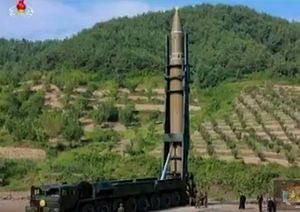On Tuesday, July 4, North Korean state media announced that the country had carried out its first-ever flight test of an intercontinental ballistic missile.
According to North Korea’s Korean Central News Agency, Kim Jong-un approved the launch of a Hwasong-14 intercontinental ballistic missile, which is also known as the KN-14.
The Hwasong-14 missile involved in Tuesday’s test has been a known system for some time and first appeared in a North Korean military parade. It remains unclear if the missile is a two- or three-stage ICBM. The system uses liquid propulsion.
During a special broadcast on Tuesday, hours after the launch, North Korea’s national broadcaster noted that the launch was successful, that the system is an intercontinental system, and that the missile traveled to a range of 934 kilometers, matching earlier estimates from South Korea and Japan.
The North Korean announcement added that the missile reached an altitude of 2,800 kilometers and flew for 39 minutes.
Extrapolating a maximum range from the observed flight on Tuesday, the missile would likely be capable of striking most of Alaska, but likely not Hawaii or the continental United States.
The announcement added that North Korea could now target any part of the world and had finally overcome the threat of an attack by the United States through deterrence.
An initial North Korean ICBM test is a major regional development in Northeast Asia that will bear not only on U.S. alliances in the region, but also affect the policy options available to the United States.
North Korea had noted earlier this year that it had “entered the final stage of preparation for the test launch of [an] intercontinental ballistic missile” in 2016. Shortly thereafter, North Korean officials noted that an ICBM test could occur at any time.
U.S. President Donald J. Trump, in a tweet in January, during the presidential transition period, noted that “North Korea just stated that it is in the final stages of developing a nuclear weapon capable of reaching parts of the U.S. It won’t happen!”

































